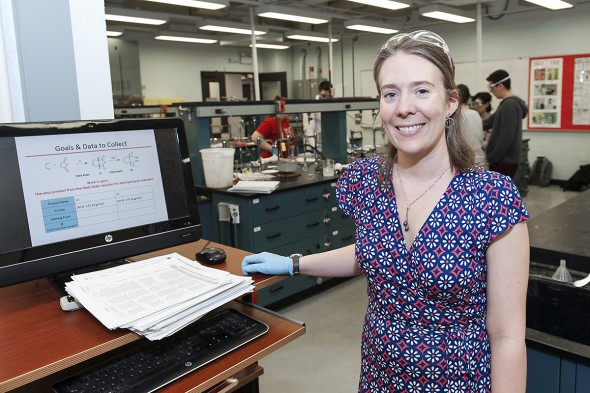Guiding undergrads through a really hard class

“So I try my best to remember that you don’t always teach to the top student,” says Lindsey McQuade. Photo: Roberta Dupuis-Devlin/UIC Photo Services
Since 1966, the Silver Circle Award has been presented to some of UIC’s best teachers. Winners, who are honored at their college commencements, receive $500 and their names join a long list of distinguished colleagues. But what makes the award especially meaningful is its selection committee: the graduating seniors.
Organic chemistry: a tough course required for every student considering a health care career. A course that haunts their dreams, even decades later.
A course where a good teacher can make a real difference.
“I just try to remember that organic chemistry is really, really hard,” says Lindsey McQuade, clinical assistant professor of chemistry in the College of Liberal Arts and Sciences, who teaches organic chemistry and runs the O Chem labs eight hours a day, five days a week.
Since most of her students are not chemistry majors, she tries to teach in a way that makes sense to them.
“They need to do it to get through, but maybe they don’t have the same background or the same interest level a chemistry major may bring to class,” McQuade says. “So I try my best to remember that you don’t always teach to the top student.”
Students have one four-hour lab session each week, in groups of 22 students. The labs encourage teamwork and create a sense of community, she says.
“A lot of the lab is more active learning, with students talking to each other and trying to figure it out for themselves. Sometimes I see people later on who used to be lab partners and they’re dating now or they’re friends.”
McQuade came to UIC two years ago after completing a postdoctoral fellowship at Stanford and graduate studies at Massachusetts Institute of Technology, where she focused more on research than teaching. “But I always wanted to teach,” she says. “I like getting people to understand chemistry and get excited about it.
“I really like the diversity of UIC students — there’s a very specific type of person that goes to schools like Stanford and MIT,” she adds. “I like that I have students here who are coming back to school after already having a degree and doing something else, people who come from lots of different cultures and backgrounds.
“It makes teaching different because you really have to teach to everyone.”
Categories
Topics
awards, chemistry, College of Liberal Arts and Sciences, commencement, graduation, Silver Circle, teaching
